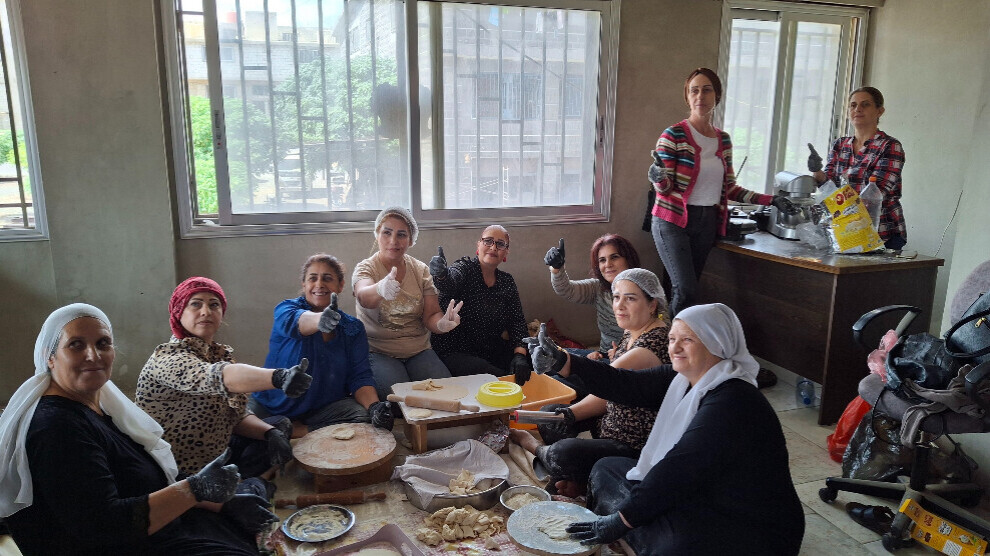Women and Stories of Resistance in Suwayda
The members of the “Sabaya Sanad” team emphasize that women’s solidarity can transform pain into daily resistance, and that support for celiac patients begins with the smallest details, with a loaf of bread kneaded with love.

ROCHELLE JUNIOR
Suwayda – In the town of Shahba in Suwayda, a remarkable voluntary women’s initiative has emerged under difficult humanitarian conditions. Women who came together under the name “Sabaya Sanad” have begun producing special bread for celiac patients. This step not only reflects the spirit of social solidarity but also demonstrates the power of women to transform crises into direct support.
Previously known as “Taa Neghanni” (“Let’s Sing”), the group initially aimed to sing songs and perform in mountain villages and at the Roman Theater. But after the attacks on Suwayda, they changed their path. Renaming themselves, the group wanted to provide real support. From songs to bread, from festivities to weekly actions, the group has become visible in every corner of Shahba. The women support patients, children, guests, and even guards, proving that women’s solidarity can transform pain into daily resistance.
‘Breaking the diet causes health problems’
The group’s coordinator, Jumana Nasif, explained their work:
“Today we came to make bread for celiac patients in Shahba. A month ago, we saved some flour that had reached us, because we were worried about bread shortages. Previously, the Red Crescent provided us with bread, but today, since the convoy was delayed, we decided to bake bread with our own hands. We know that this group suffers a lot; people do not understand the seriousness of this disease. Breaking the diet can lead to serious health problems. That’s why we wanted to deliver bread to every patient one by one so that no one would be forced to eat bread that harms their health.”
‘Solidarity begins with bread kneaded with love’
There are about 60 celiac patients in Shahba. Most live under harsh conditions and depend on intermittent aid. Jumana Nasif says: “We hope to deliver one or two bundles of bread to each patient. This is not just a food initiative; it is also a message of support and embrace. We believe that true solidarity begins with a loaf of bread kneaded with love.”
An appeal to aid organizations
Celiac patient Abir al-Kufeyri described the difficulties she faces:
“I have had to follow the diet for eight years. I know very well what it means when the diet is broken. Since the recent events, in two and a half months we have been able to get bread only once or twice. There is no electricity, no gas, and many people are still in shelters. Even if we find flour, we cannot bake bread. We appeal to humanitarian organizations: support us with gluten-free bread, because we have no other alternative. If we are forced to eat wheat products, we suffer severe stomach problems, vomiting, diarrhea, and exhaustion. Children aged 10 and under cannot even find a biscuit, and this is very painful.”
‘We will not leave anyone alone’
Group member Ramiya Hamza also spoke about the process of transformation:
“In the beginning, we were 20 women, wearing traditional clothes, preserving mountain culture, and singing songs. Over time we grew to 50, then 200 members. We sang in the Roman Theater and in public squares. But the massacres and violations in Suwayda changed everything. At that moment we realized that joy alone was not enough; we had to be a helping hand. That is why we transformed into a support team. Today we bake bread, we work in shelters, we are present at guard posts, and every week we call for the release of the kidnapped. We will not leave anyone alone.”
‘Women must be supported’
Nutritionist Doha al-Hatib provides both scientific and practical support to the initiative. She explains that celiac disease is very sensitive and requires complete avoidance of gluten (wheat and its derivatives):
“Gluten-free bread from Damascus has stopped coming. That’s why we are forced to make it ourselves using corn flour. Gluten intake can cause serious complications, especially in children. That is why the work of the women of Shahba is very valuable and must be supported in every way. Women are carrying a huge burden, but every day they prove again that they are ready to take responsibility and to face siege and hunger with dignity.”
